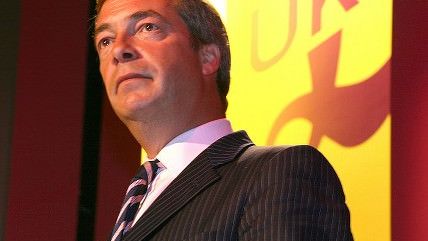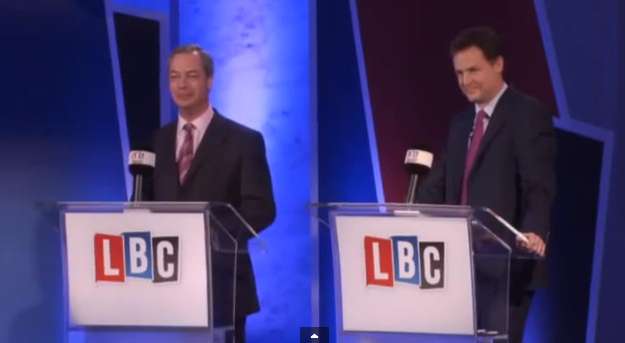E.U. Debate Highlights Why Libertarians Shouldn't Support the U.K. Independence Party


Last night the British deputy prime minister and leader of the Liberal Democrats, Nick Clegg, and the leader of the United Kingdom Independence Party (UKIP), Nigel Farage, debated the U.K.'s membership in the European Union. The "debate" was more of a Q&A with the audience than an actual debate between the two men, but despite its format the event did allow for Clegg and Farage to make their cases and vent some frustration.
It's unlikely that many people watching the debate will have had their opinion on U.K. membership in the E.U. changed by the two men's arguments. Clegg offered the usual justifications for staying in, while Farage rehearsed reasons for getting out.
The debate did highlight, however, that despite the E.U.'s burdensome and undemocratic attributes, UKIP is not offering solutions that should be welcomed by libertarians. This is important to note given that the party's constitution (apparently removed from the party's website as part of a recent redesign) does describe the party as "libertarian." The party has been described as having "a strong libertarian flavour (sic)" and Farage himself has reportedly claimed that the party is libertarian.
Farage did make good points about the undemocratic state of the E.U. and made it clear that he is sympathetic to trade without interference from politicians and bureaucrats. "Trade is not something created by politicians and bureaucrats," he said. "Trade is created by consumers who make a decision: 'I like this product, I'm prepared to pay its price.'"
However, Farage's comments on immigration were less enlightened. One of the E.U.'s few redeeming features is its open borders policy, and it was this policy that sparked one of the most fiery parts of the debate. Clegg argued "to pull up our drawbridge we would destroy jobs for everybody in this country." Farage argued that open borders may have made sense when it applied to countries with a standard of living comparable to the U.K.'s, but that now that the policy applies to poorer countries which were once behind the Iron Curtain the policy should be changed.
UKIP's record on alarming predictions about immigration isn't very impressive. The quasi-libertarian party warned of immigrants coming to the U.K. from Bulgaria and Romania, two of the E.U.'s most recent members, ahead of migration controls being lifted at the beginning of this year. Since those controls were lifted Bulgarians and Romanians have not swarmed into the U.K.
That Farage is so concerned about workers from poor European countries coming to the U.K. and being willing to work for less money than most Britons underscores the fact that UKIP is more interested in implementing populist policies that would give advantages to British workers and British businesses than it is in establishing a limited government tasked only with protecting Britons' liberties.
While I might not be a fan of UKIP's immigration policy the party is right to condemn the E.U.'s democratic deficit, which Clegg and other fans of the E.U. should work quickly to address and reform if they want to halt UKIP's increasing popularity.
Polling from YouGov suggests that most Britons think Farage performed better than Clegg. Watch the debate below and see if you agree:
